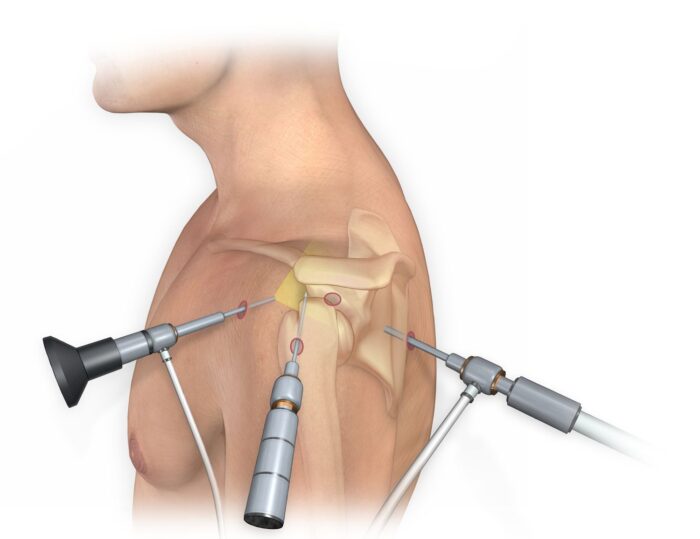Arthroscopy Surgery in Mathura: An Overview
Arthroscopy is a surgical procedure used by Orthopaedic Surgeons to view inside the joints. It is a minimally invasive procedure done through small incisions and enables doctors to diagnose and treat a wide range of conditions including arthritis, ACL tears, and rotator cuff tears among others. Different types of arthroscopy treat different joint and ligament conditions.

Arthroscopy: Why It’s Done?
Arthroscopy can be done for a wide range of reasons, mainly to diagnose and treat various joint-related conditions. Some common reasons why arthroscopy is done include:
- Diagnosis: Through arthroscopy, orthopaedic surgeons can directly visualise the joint’s internal structures and identify issues such as cartilage damage, ligament tears, meniscal tears, loose bodies, and signs of arthritis.
- Treatment: Once a joint condition is diagnosed, arthroscopy can be used to treat the issue minimally invasively. Some common arthroscopic treatments include removing loose bodies, meniscal repair or removal, ligament reconstruction and cartilage repair.
- Preoperative Evaluation: Arthroscopy is sometimes used for preoperative evaluation, especially when open surgery is required. It allows surgeons to better plan their approach and understand the extent of the joint damage.
Types of Arthroscopic Surgery:
- ACL Reconstruction: Anterior Cruciate Ligament (ACL) reconstruction is a procedure commonly performed using arthroscopy. It involves replacing a torn or damaged ACL in the knee with a graft (generally taken from the patient’s tissue or a donor) to restore stability and function to the knee joint.
- Meniscal Repair: Meniscal Repair is another arthroscopic procedure that is used to treat a torn meniscus, which is a C-shaped cartilage in the knee. If a meniscus tear is repaired in time, it can reduce the risks of developing osteoarthritis of the knee in the future.
- Shoulder Arthroscopy: As the name suggests, shoulder arthroscopy is a minimally invasive surgery that involves using an arthroscope and specialized instruments to diagnose and treat conditions affecting the shoulder joint. It is a widely used technique for addressing shoulder problems and is the preferred method over traditional open surgery due to its many benefits.
- Rotator Cuff Repair: A rotator cuff is a group of tendons and muscles that aid in stabilising and moving the shoulder joint. Rotator cuff tears are common injuries and are usually addressed through arthroscopic surgery. The Orthopaedic Surgeon can visualise the torn rotator cuff tendon and fix it with arthroscopic equipment by stitching the torn edges together, using specialised arthroscopic instruments.
What Happens During an Arthroscopy Surgery?
Here are the general things that happen during an arthroscopy surgical procedure:
- Anaesthesia: Before the procedure begins, the patient is given anaesthesia to ensure that they are comfortable and pain-free throughout the surgery.
- Incisions: The orthopaedic surgeon will proceed to make small incisions in the treatment area. These incisions serve as portals through which arthroscope and other surgical instruments are inserted.
- Procedure: After insertion of the arthroscope, the doctor will be able to visualise and examine the joints. Depending on the purpose of the arthroscopy, the surgeon may perform various surgical interventions to treat the problem.
- Closure: Once the necessary procedure has been performed, the incisions will be closed with sutures or surgical glue.

What Happens After Arthroscopy?
After arthroscopy, the patient enters the post-operative phase of recovery. For a few weeks, you may be asked to:
- Not put weight or pressure on the area
- Ice and elevate the area
- Keep the incision clean and covered.
- Take medications as advised by your doctor
- Physical therapy and rehabilitation, if advised
- Have a follow-up appointment
How Long is the Hospital Stay After Arthroscopic Surgery?
After arthroscopic surgery, the length of hospital stay can vary based on the particular treatment done, the patient’s general condition, and the hospital’s policies. As it is a minimally invasive technique, arthroscopic surgery often allows patients to leave the hospital in just a day. A brief hospital stay of 2 to 3 days, however, might be required in some circumstances.
What Are the Potential Benefits of Arthroscopy?
Arthroscopy surgery offers several advantages over traditional open surgery, which include:
- Minimally Invasive
- Reduced Pain
- Quicker Recovery
- Minimal Risk of Complications
- Lower Blood Loss and Scarring
- Targeted Treatment
- Improved Visualization

What Are the Potential Benefits of Arthroscopy?
Arthroscopy surgery offers several advantages over traditional open surgery, which include:
- Minimally Invasive
- Reduced Pain
- Quicker Recovery
- Minimal Risk of Complications
- Lower Blood Loss and Scarring
- Targeted Treatment
- Improved Visualization
What Are the Risks of Arthroscopy Surgery?
While arthroscopy is generally considered safe, like any surgery, it carries some risks and potential complications. Some of the possible risks and complications of arthroscopy include:
- Infection at the surgical site
- Excessive bleeding
- Nerve or blood vessel damage
- Stiffness or persistent pain
- Allergic reactions
What is the Cost of Arthroscopy Surgery?
The precise joint being treated, the intricacy of the treatment, the surgeon’s experience, and the patient’s location can all affect the cost of an arthroscopy procedure. The total costs associated with getting an arthroscopy may include pre-operative evaluations, surgery fees, anaesthesia, operating room costs, post-operative care, and any required follow-up consultations.
Arthroscopy Surgery in Mathura- Get the Best Treatment by Dr Swapnil Verman
Arthroscopy surgery is a highly beneficial and innovative approach to diagnosing and treating various joint-related issues. It is commonly used for procedures such as ACL reconstruction, meniscal repair, shoulder arthroscopy, and rotator cuff repair.
Want to live a pain-free life? Schedule an appointment with Dr. Swapnil Verman, the best Arthroscopy Surgeon in Mathura.
Get precise and most advanced arthroscopy surgery in Mathura with the most renowned orthopaedic surgeon, Dr Swapnil Verman, in Mathura, Uttar Pradesh.
Contact us
Make an Appointment
Contact
+ 91 9760070333
Location
Verman Hospital,Sadar Road,Mathura,281001
